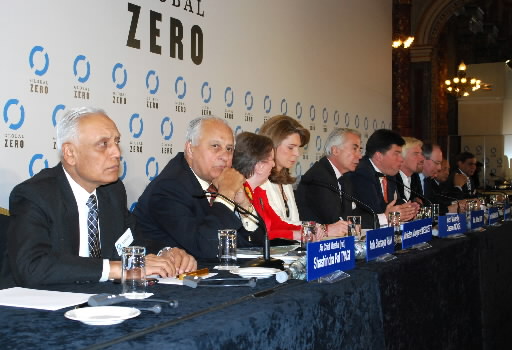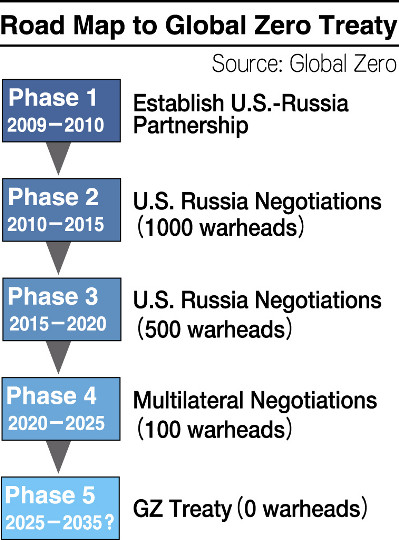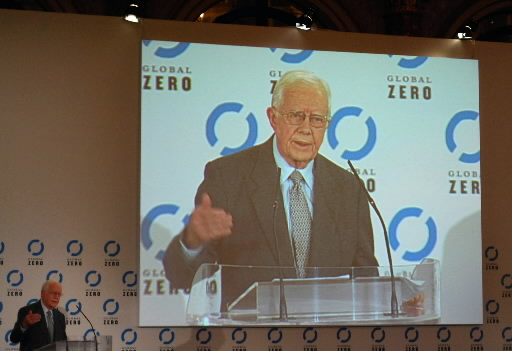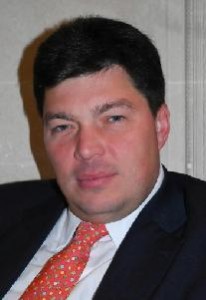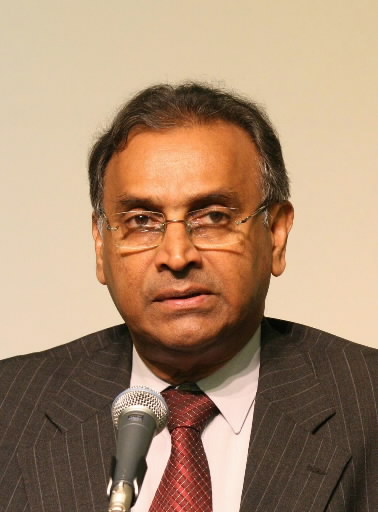Nuclear weapons can be eliminated: Global Zero initiative backed by prominent figures
Mar. 29, 2009
by Akira Tashiro, Executive Director of the Hiroshima Peace Media Center
Global Zero, an international initiative with the goal of abolishing nuclear weapons by 2035, has begun to attract attention. Following the publication in January 2007 of an article by former U.S. Secretary of State Henry Kissinger and three other former top U.S. officials calling for a nuclear-free world, the World Security Institute, a Washington-based think tank and others have taken up the cause. Former U.S. and Soviet presidents Jimmy Carter and Mikhail Gorbachev are among the more than 100 prominent leaders who are signatories to the Global Zero initiative. Carter attended the inaugural conference in Paris in December of last year and delivered a speech. After two days of deliberations, a step-by-step path to “phased and verified reductions” in nuclear weapons was laid out.
The Global Zero initiative calling for the abolition of nuclear weapons features five phases of gradual reduction. (See diagram.)
Phase 1: 2009-2010
Declare the joint goal of eliminating all nuclear weapons in 25 years
Prepare for bilateral U.S.-Russia negotiations on nuclear arms
Further Strategic Arms Reduction Treaty (START) reductions
Coordinate and intensify efforts to resolve proliferation threats
In line with this phase, in early March the U.S. and Russia, which between them possess 96% of the world’s nuclear weapons, resumed nuclear disarmament negotiations in Geneva. They agreed to reach consensus within the year on a new framework for disarmament negotiations to replace START.
Phase 2: 2010-2015
Negotiate deep bilateral cuts to 1,000 total nuclear weapons
Full implementation by 2020
Negotiate de-alerting measures
Begin consultations with other nuclear weapons states
Resolve immediate proliferation threats: Iran and North Korea
Begin consultations for international fuel cycle management
Phase 3: 2015-2020
Negotiate deep bilateral cuts to 500 total nuclear weapons
Begin consultations between nuclear weapons states on constraints, e.g. freezes, cuts
Agree to plan for international fuel cycle management
Phase 4: 2020-2025
Cuts to 100 total nuclear weapons by all nuclear weapons states
Agreement on phased elimination, verification
New comprehensive verification regime
Complete and sign Global Zero treaty
Phased implementation of international fuel cycle management
Phase 5: 2025-2035
Achieve Global Zero by bringing nuclear stockpiles down to zero
Continuous implementation of verification required
More than 100 politicians, diplomats, scholars, military leaders and others from the U.S., Russia, India, Pakistan, Japan and Australia attended the inaugural conference of the Global Zero initiative. Former U.S. government official Richard Burt, who chaired the conference, conveyed a sense of urgency about the abolition of nuclear weapons, saying, “The gravest danger facing the world is that nuclear weapons continue to spread until one day they are used by a country or a terrorist group.” At the same time he was circumspect about the prospects for doing so in the near future. “The only way to prevent this is to eliminate all nuclear weapons through step-by-step phased and verified reductions,” he said. “That will take 20 to 30 years.”
Mr. Burt served as chief U.S. negotiator in the strategic arms reduction talks under President George H.W. Bush in the early 1990s. Based on his experiences, he pointed out the need for high-level policy negotiations. “We can only proceed under a system that all parties can accept, including the inspection regime,” he said.
Under Global Zero there is an ongoing effort to seek the support of prominent leaders of other countries that are directly or indirectly involved in the nuclear weapons issue. The support of people around the world, including young people, is also being sought by collecting signatures on a declaration via the initiative’s website, which states: “We, the undersigned, believe that to protect our children, our grandchildren, and our civilization from the threat of nuclear catastrophe, we must eliminate all nuclear weapons globally.”
Anyone can sign the declaration via the Global Zero website, which is available in six languages including English, Russian, and Chinese.
Joseph Cirincione, president of the Ploughshares Fund, a non-profit organization in the U.S. that was one of the sponsors of the conference in Paris, said, “A very important and ambitious effort toward nuclear disarmament and abolition has begun. I would like the leaders and citizens of the world to know that the nuclear problem is an important issue that must be resolved, just like global warming and poverty.”
Global Zero plans to hold a conference to be attended by about 500 people in January 2010 prior to the review conference of the Nuclear Non-proliferation Treaty.
The Non-Proliferation Treaty is deeply wounded now and its very life is threatened.
In fact, the behavior of nuclear weapon states in regard to disarmament has continued to worsen.
At this moment, I would say that prospects for success in 2010 are not good.
Many see the Non-Proliferation Treaty as just freezing the present-day existing inequalities between arrogant nuclear states and others who would like to share the benefits of an impervious defense.
It’s very encouraging that President-elect Obama has set a top goal of eliminating nuclear weapons.
Japan, if the United States severely reduces our arsenal, may object strongly to the weakening of the nuclear umbrella over Japan and attempt to fill the vacuum which would be produced by developing their own weapons.
The policy of “no first use” must be addressed by all of the nuclear weapons states.
We must remember that a global holocaust is just as possible now, through mistakes or misjudgments, as it was when I was president during the depths of the Cold War.
Before 2010, I think we need to do everything we can before the next NPT assessment at the General Assembly in the United Nations.
There is so much we can do in the next year or so to prepare for a substantive, positive NPT assessment that we haven’t seen now in 15 years.
There could not be any greater and more useful effort on the globe today.
Mikhail V. Margelov, chairman of the Foreign Affairs Committee of the Federation Council of Russia
Global Zero is a unique initiative for nuclear disarmament. It shows that, with the threat of nuclear proliferation and nuclear terrorism, the leaders of the world have begun to seriously consider the nuclear problem.
Peace and security are important for Russia’s growth and modernization. Pouring money into the military poses an impediment to economic development and is immoral besides. Nuclear disarmament by the U.S. and Russia is the top priority, but we failed to accomplish anything during the eight years of the Bush administration, which was not cooperative. With presidents Obama and Medvedev it should be possible to reach agreement on major arms reductions.
Jayantha Dhanapala of Sri Lanka, president of the Pugwash Conferences on Science and World Affairs
It is significant that this sort of conference was held, but to tell the truth I was a little disappointed because I didn’t sense any urgency to work toward nuclear abolition. The Chemical Weapons Convention took effect in 1997. In reality not all chemical weapons have been abolished, but they have become illegal under international law.
A treaty banning nuclear weapons must be implemented as soon as possible. As long as there are countries that believe that the development and possession of nuclear weapons enhance their prestige, there will be countries that want to have nuclear weapons. We need to further heighten the sense of urgency.
by Akira Tashiro, Executive Director of the Hiroshima Peace Media Center
At conferences on nuclear disarmament attended by diplomats and security experts from nuclear nations, their interests often conflict, and in many cases they simply state the positions of their nations. But that was not the case this time because the participants shared the belief that the threats of nuclear terrorism and nuclear proliferation can only be eliminated through global nuclear disarmament and abolition.
A former diplomat from India and a former military leader from Pakistan defended their countries’ decisions to acquire nuclear weapons but, notably, they also issued a cooperative statement in which they addressed the risk of dependence on nuclear deterrence saying, “As long as a nation’s security can be assured, it is best to abolish nuclear weapons.”
In the debate about a step-by-step, verifiable approach to nuclear disarmament a number of people said they felt that the target of nuclear abolition in 25 years was too far into the future. At the press conference following the conference, I asked about the possibility of aligning the target with that of Mayors for Peace, an initiative of the cities of Hiroshima and Nagasaki, which calls for nuclear abolition by 2020. I did not receive a direct answer, but Mr. Burt stressed that several initiatives for nuclear abolition have been launched and they will create a synergistic effect.
With regard to the possibility of achieving nuclear abolition in the U.S., where the influence of the military-industrial complex poses an obstacle, Retired Marine Corps Gen. John J. Sheehan, former Supreme Allied Commander Atlantic for NATO, said, “If nuclear weapons do not guarantee security, they are less significant militarily. If they do not contribute to a nation’s security then there is no reason to spend taxes on them, so abolition is possible.”
There are several areas of concern, including how to encourage involvement by Iran, Israel, and North Korea, nations which were not represented at the conference. And from the standpoint of Hiroshima, I could not help feeling the pace of progress was too slow.
But because it was attended by influential figures including former political leaders and diplomats from the major nuclear powers of the U.S. and Russia, the Global Zero conference will exert a significant influence on practical politics. I would like to believe that, as Mr. Burt noted, the various initiatives toward nuclear disarmament and abolition will produce a synergistic effect.
(Originally published on March 14, 2009)
Related articles
Global forum launched to pursue nuclear arms abolition (Dec. 11, 2008)
Global Zero, an international initiative with the goal of abolishing nuclear weapons by 2035, has begun to attract attention. Following the publication in January 2007 of an article by former U.S. Secretary of State Henry Kissinger and three other former top U.S. officials calling for a nuclear-free world, the World Security Institute, a Washington-based think tank and others have taken up the cause. Former U.S. and Soviet presidents Jimmy Carter and Mikhail Gorbachev are among the more than 100 prominent leaders who are signatories to the Global Zero initiative. Carter attended the inaugural conference in Paris in December of last year and delivered a speech. After two days of deliberations, a step-by-step path to “phased and verified reductions” in nuclear weapons was laid out.
Five phases to the abolition of nuclear weapons by 2035
The Global Zero initiative calling for the abolition of nuclear weapons features five phases of gradual reduction. (See diagram.)
Phase 1: 2009-2010
Declare the joint goal of eliminating all nuclear weapons in 25 years
Prepare for bilateral U.S.-Russia negotiations on nuclear arms
Further Strategic Arms Reduction Treaty (START) reductions
Coordinate and intensify efforts to resolve proliferation threats
In line with this phase, in early March the U.S. and Russia, which between them possess 96% of the world’s nuclear weapons, resumed nuclear disarmament negotiations in Geneva. They agreed to reach consensus within the year on a new framework for disarmament negotiations to replace START.
Phase 2: 2010-2015
Negotiate deep bilateral cuts to 1,000 total nuclear weapons
Full implementation by 2020
Negotiate de-alerting measures
Begin consultations with other nuclear weapons states
Resolve immediate proliferation threats: Iran and North Korea
Begin consultations for international fuel cycle management
Phase 3: 2015-2020
Negotiate deep bilateral cuts to 500 total nuclear weapons
Begin consultations between nuclear weapons states on constraints, e.g. freezes, cuts
Agree to plan for international fuel cycle management
Phase 4: 2020-2025
Cuts to 100 total nuclear weapons by all nuclear weapons states
Agreement on phased elimination, verification
New comprehensive verification regime
Complete and sign Global Zero treaty
Phased implementation of international fuel cycle management
Phase 5: 2025-2035
Achieve Global Zero by bringing nuclear stockpiles down to zero
Continuous implementation of verification required
100 leaders from around the world gather for inaugural conference in Paris
More than 100 politicians, diplomats, scholars, military leaders and others from the U.S., Russia, India, Pakistan, Japan and Australia attended the inaugural conference of the Global Zero initiative. Former U.S. government official Richard Burt, who chaired the conference, conveyed a sense of urgency about the abolition of nuclear weapons, saying, “The gravest danger facing the world is that nuclear weapons continue to spread until one day they are used by a country or a terrorist group.” At the same time he was circumspect about the prospects for doing so in the near future. “The only way to prevent this is to eliminate all nuclear weapons through step-by-step phased and verified reductions,” he said. “That will take 20 to 30 years.”
Mr. Burt served as chief U.S. negotiator in the strategic arms reduction talks under President George H.W. Bush in the early 1990s. Based on his experiences, he pointed out the need for high-level policy negotiations. “We can only proceed under a system that all parties can accept, including the inspection regime,” he said.
Under Global Zero there is an ongoing effort to seek the support of prominent leaders of other countries that are directly or indirectly involved in the nuclear weapons issue. The support of people around the world, including young people, is also being sought by collecting signatures on a declaration via the initiative’s website, which states: “We, the undersigned, believe that to protect our children, our grandchildren, and our civilization from the threat of nuclear catastrophe, we must eliminate all nuclear weapons globally.”
Anyone can sign the declaration via the Global Zero website, which is available in six languages including English, Russian, and Chinese.
Joseph Cirincione, president of the Ploughshares Fund, a non-profit organization in the U.S. that was one of the sponsors of the conference in Paris, said, “A very important and ambitious effort toward nuclear disarmament and abolition has begun. I would like the leaders and citizens of the world to know that the nuclear problem is an important issue that must be resolved, just like global warming and poverty.”
Global Zero plans to hold a conference to be attended by about 500 people in January 2010 prior to the review conference of the Nuclear Non-proliferation Treaty.
Excerpts from President Jimmy Carter’s speech at the Global Zero conference
The Non-Proliferation Treaty is deeply wounded now and its very life is threatened.
In fact, the behavior of nuclear weapon states in regard to disarmament has continued to worsen.
At this moment, I would say that prospects for success in 2010 are not good.
Many see the Non-Proliferation Treaty as just freezing the present-day existing inequalities between arrogant nuclear states and others who would like to share the benefits of an impervious defense.
It’s very encouraging that President-elect Obama has set a top goal of eliminating nuclear weapons.
Japan, if the United States severely reduces our arsenal, may object strongly to the weakening of the nuclear umbrella over Japan and attempt to fill the vacuum which would be produced by developing their own weapons.
The policy of “no first use” must be addressed by all of the nuclear weapons states.
We must remember that a global holocaust is just as possible now, through mistakes or misjudgments, as it was when I was president during the depths of the Cold War.
Before 2010, I think we need to do everything we can before the next NPT assessment at the General Assembly in the United Nations.
There is so much we can do in the next year or so to prepare for a substantive, positive NPT assessment that we haven’t seen now in 15 years.
There could not be any greater and more useful effort on the globe today.
Comments by conference participants
Mikhail V. Margelov, chairman of the Foreign Affairs Committee of the Federation Council of Russia
Global Zero is a unique initiative for nuclear disarmament. It shows that, with the threat of nuclear proliferation and nuclear terrorism, the leaders of the world have begun to seriously consider the nuclear problem.
Peace and security are important for Russia’s growth and modernization. Pouring money into the military poses an impediment to economic development and is immoral besides. Nuclear disarmament by the U.S. and Russia is the top priority, but we failed to accomplish anything during the eight years of the Bush administration, which was not cooperative. With presidents Obama and Medvedev it should be possible to reach agreement on major arms reductions.
Jayantha Dhanapala of Sri Lanka, president of the Pugwash Conferences on Science and World Affairs
It is significant that this sort of conference was held, but to tell the truth I was a little disappointed because I didn’t sense any urgency to work toward nuclear abolition. The Chemical Weapons Convention took effect in 1997. In reality not all chemical weapons have been abolished, but they have become illegal under international law.
A treaty banning nuclear weapons must be implemented as soon as possible. As long as there are countries that believe that the development and possession of nuclear weapons enhance their prestige, there will be countries that want to have nuclear weapons. We need to further heighten the sense of urgency.
Perspective: Hopes for synergistic effect that will lead to abolition
by Akira Tashiro, Executive Director of the Hiroshima Peace Media Center
At conferences on nuclear disarmament attended by diplomats and security experts from nuclear nations, their interests often conflict, and in many cases they simply state the positions of their nations. But that was not the case this time because the participants shared the belief that the threats of nuclear terrorism and nuclear proliferation can only be eliminated through global nuclear disarmament and abolition.
A former diplomat from India and a former military leader from Pakistan defended their countries’ decisions to acquire nuclear weapons but, notably, they also issued a cooperative statement in which they addressed the risk of dependence on nuclear deterrence saying, “As long as a nation’s security can be assured, it is best to abolish nuclear weapons.”
In the debate about a step-by-step, verifiable approach to nuclear disarmament a number of people said they felt that the target of nuclear abolition in 25 years was too far into the future. At the press conference following the conference, I asked about the possibility of aligning the target with that of Mayors for Peace, an initiative of the cities of Hiroshima and Nagasaki, which calls for nuclear abolition by 2020. I did not receive a direct answer, but Mr. Burt stressed that several initiatives for nuclear abolition have been launched and they will create a synergistic effect.
With regard to the possibility of achieving nuclear abolition in the U.S., where the influence of the military-industrial complex poses an obstacle, Retired Marine Corps Gen. John J. Sheehan, former Supreme Allied Commander Atlantic for NATO, said, “If nuclear weapons do not guarantee security, they are less significant militarily. If they do not contribute to a nation’s security then there is no reason to spend taxes on them, so abolition is possible.”
There are several areas of concern, including how to encourage involvement by Iran, Israel, and North Korea, nations which were not represented at the conference. And from the standpoint of Hiroshima, I could not help feeling the pace of progress was too slow.
But because it was attended by influential figures including former political leaders and diplomats from the major nuclear powers of the U.S. and Russia, the Global Zero conference will exert a significant influence on practical politics. I would like to believe that, as Mr. Burt noted, the various initiatives toward nuclear disarmament and abolition will produce a synergistic effect.
(Originally published on March 14, 2009)
Related articles
Global forum launched to pursue nuclear arms abolition (Dec. 11, 2008)

